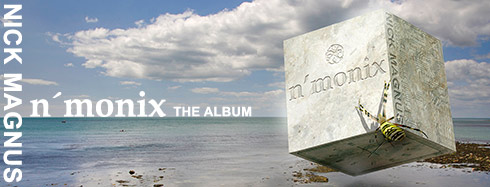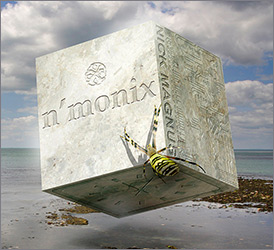- Article
- Read in 6 minutes
Nick Magnus – n’monix – CD review
After the well receivedChildren Of Another God, Steve Hackett’s sideman Nick Magnus has recorded another solo album – n’monix. Martin Brilla reviewed it for you.

Children Of Another God was not my first Nick Magnus album, but unlike Inhaling Green, which I had come across by accident, I enjoyed not just parts of Nick’s 2010 album but all of it. Carried by my enthusiasm I got hold of his other solo CDs – not an easy job. When I heard the news that he would put out a new album I got excited.
Since most of Nick’s musical career, particularly as Steve Hackett’s keyboarder on twelve albums from Spectral Mornings to Feedback ’86 from 1978 to 1989 has been covered in my review of Children Of Another God we shall not cover that ground again here.
Another thing. The instruments mentioned in this review are wrong or at least not precise, with few exceptions: Though they sound like the real thing most of them are only digital reproductions. Sometimes you can hear it if you listen very carefully, but most of the time you will not realize it.
01 – Time (06:23)
Screeching electric guitars for a start – is this really a keyboarder’s solo album? After Children Of Another God this does not surprise me with Nick Magnus. All keyboard fans may rest assured that there are enough organ an mellotron sounds to be heard on this CD – but there are also lots of guitars and bass, urging forwards or adding melodies. Very accomplished, very rocky, the mark of Nick’s musical talent and experience. The song is about time and how „all time creates, time will devour“. Tony Patterson of ReGenesis provides vocals. After another scream off electric guitars the song ends suddenly.
02 – Memory (05:24)
Cut. Slow hard percussion becomes the leading element before it, too,fades. Strings are left, and a melody begins that is picked up by Kate Faber’s clear soprano. This could be music from The Lord Of The Rings. Great atmosphere and fine arrangement. The hard percussion from the beginning returns and leads into the monumental closing part: A choir of many voices (or whatever) takes over the final verse. The element of time is expressed cleverly by a ticking clock that accentuates the rhythm.
The song is about memory, time’s sister. Personally, I would have preferred a timbre like Dawn Upshaw’s over Kate’s voice. You can get a first impression here: Nick Magnus & Kate Faber im Studio
03 – Kombat Kid(06:28)
The next song is a bit quieter, too, at least at first. The brighter mood reminds the reviewer of Star Trek: Deep Space Nine, perhaps because of the ethereal strings and the gleaming solo trumpet. The strings then begin a march, the drums join in, brass plays ominous fanfares. Everything is arranged very well, one does not realize the sounds are artificial. Suddenly a rock transition indicates that the core of this song is different – a rock ballad sung by Tony Patterson. In between there are brief interludes, syncopes, rhythm changes, later quieter passages and mellotron sounds. It all ends with a fine sound collage. This is the stuff prog fans expect.
The topic is how a child is dependent on a bloody video game.
04 – Headcase (03:49)
Written around a funky e-piano this is a song well-suited for AOR. It would not seem out of place on a Toto album, complete with a synthesizer solo. Nick himself sings and a good job he does.
The line “Old people from Texas eat spiders”, which is frequently repeated, is a mnemonic device for medical school students to remember the bones of the skull.
05 – Eminent Victorians (07:01)
Hand organ leads us into this song that presents celebrities of the Victorian era as a cabinet of curiosities. The lyrics then move on to unpleasant details of that age such as child labour. Peter Hicks, former singer for Steve Hackett, sings here. His voice sometimes sounds a bit like Rodger Hodgson’s (of Supertramp).
The first guitar solo (after some three minutes) is played by Nick. Starting at 05:36 Steve Hackett proceeds to play one of the best solos the reviewer has heard in recent years.
Though one could go on and on about the song I will keep it short and sweet here, for Nick has put online an impressive and impressively funny video so that I can spare the vain efforts to grasp this song: Nick Magnus – Eminent Victorians
06 – Broken (08:05)
A change of scenery. Vocals with very sympathetic instruments lead into a sensitive slow ballad that could be amongst the best of George Michael’s. Beautiful and sad, it grows slowly. Tim Bowness (No-Man with Steve Wilson) sings very well.
What is more, Rob Townsend (Steve Hackett band) plays a fabulous soprano saxophone solo that adds a touch of jazz to the song. Townsend also plays the flute here. After a second verse of weary lyrics it all seems over, but then there is a sort of guitar solo as a prelude to a second sax solo of Rob Townsend’s that is as impressive as the first one. Steve Hackett can also beard in the background on this track.
Here is an impression of the song: Nick Magnus & Rob Townsend
07 – Shadowland (02:51)
Steve Hackett shows what he can do with an electric guitar. He is accompanied by some atmospheric choir sounds only, and that is all we want to say about the song here, because you can listen to it as a whole: Nick Magnus – Shadowland featuring Steve Hackett.
08 – Entropy (06:46)
An electric piano comes in followed by synth chords a la Banks or Hackett – something to please every prog-head – the introduction to another ballad. All that can be has been, all that can be, will be. A kind of finale sung by James Reeves, unspectacular, contemplative, fine. The final ‘guitar solo’ resembles the one Steve plays on Spectral Mornings.
A spot of criticism: The lyrics are apt for a finale, and it is undoubtedly beautiful music. Still it seems to be one of the weaker songs on the album, which makes it not the best candidate for a CD ending. One solution could have been letting Steve play the guitar solo, perhaps? But that is a tiny detail.
 Is n’monix a prog album? No, it is not, at least not a pure one. It certainly goes down the prog road but it also takes the liberty of leaving it now and then. It may seem heterogenous, but it does not make it arbitrary. When you listen to Nick’s five solo album (which I finally can) you realize that it is all Nick. He is very versatile and refuses to be tied down or categorized. He loves prog rock as much as he enjoys the atmospheric and film scores. This album proves that he can do it all as a one-man show (according to the booklet he did “keyboards, synthesizers, occasional vocals, engineering, production”; the compositions and arrangements are also his own). Besides, mixing up various styles is one characteristic of progressive rock…
Is n’monix a prog album? No, it is not, at least not a pure one. It certainly goes down the prog road but it also takes the liberty of leaving it now and then. It may seem heterogenous, but it does not make it arbitrary. When you listen to Nick’s five solo album (which I finally can) you realize that it is all Nick. He is very versatile and refuses to be tied down or categorized. He loves prog rock as much as he enjoys the atmospheric and film scores. This album proves that he can do it all as a one-man show (according to the booklet he did “keyboards, synthesizers, occasional vocals, engineering, production”; the compositions and arrangements are also his own). Besides, mixing up various styles is one characteristic of progressive rock…
For my money it is very good, sophisticated music, and that is a lot today. Magnus has already shown on Children Of Another God that he is a good composer; as on the previous album he turns Dick Foster’s lyrics into very fitting music. His arrangements and instrumentations are very clever; what is new and very well-done is the use of a virtual orchestra. Magnus is said to have worked on this album for two years. He has not taken the easy way. He pays careful attention to the details – just listen to how versatile and clever the uses the e-bass.
All those who “suffered” from Tony Banks’ later solo album may be relieved to read that you do not realize that Children Of Another God as well as n’monix have been written and performed mainly by one keyboarder only; n’monix is really a lively album.
Is n’monix a concept album? We would not go so far as to say that, but there is a common topic to all the songs. One way or another, they are all about time and memory (and those words occur, incidentally, in the titles of the first two tracks).
The booklet is not (as some productions do) playful, but well-structured and appealing to the eye. Each song has its own page with the lyrics, if there are any, and a matching image. There are also photos of all musicians as well as information and graphics about the topic. Everything is informative and clear. The art work for this album is much better than for the previous CD.
We can only recommend this album. Some things will really speak to you, other songs take a few times to really click. Paying attention to the lyrics heightens the pleasurable experience.
by Martin Brilla, English by Martin Klinkhardt
